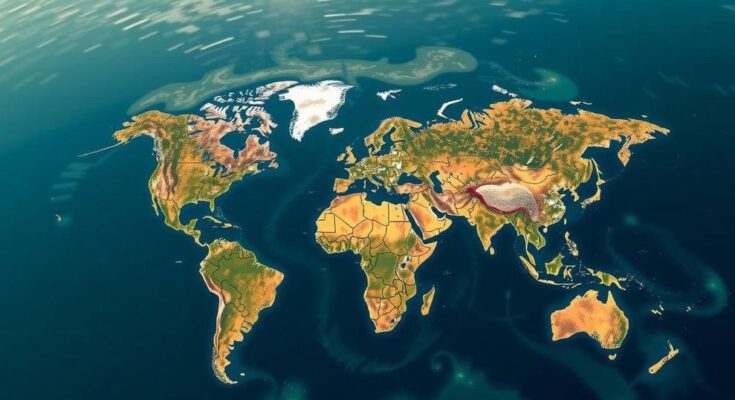Climate change is increasingly forcing millions to migrate, especially in vulnerable nations. During the Baku climate talks, Ugochi Daniels from the IOM outlined pressing issues related to climate displacement, revealing that about 26 million people were forced from their homes last year. Upcoming projections indicate 216 million people could migrate due to climate impacts by 2050, with Africa among the most affected regions. Effective solutions involving community engagement and support are urgently needed to address these challenges.
The escalating impacts of climate change are resulting in increasing numbers of individuals being displaced from their homes, particularly in vulnerable regions. Ugochi Daniels, Deputy Director General for Operations at the International Organization for Migration (IOM), highlighted urgent migration issues, including disaster displacement and planned relocation, during the recent climate talks in Baku. Alarmingly, approximately 26 million individuals were displaced in the past year due to climate-driven events, emphasizing a deepening global crisis influenced by deteriorating environmental conditions. Daniels also cited World Bank projections indicating that by 2050, an estimated 216 million people will be compelled to migrate due to climate impacts, with significant numbers in Africa facing dire circumstances. Dry spells and extreme weather events, like those haunting Nigeria and other parts of Africa, exacerbate vulnerabilities and undermine efforts for sustainable development. Additionally, the role of remittances from migrants, amounting to a trillion dollars annually, underscores their importance in supporting affected communities even as climate impacts persist. At the COP, IOM remains focused on enhancing visibility of climate migration issues while advocating for vulnerable populations in climate financing discussions. The organization supports the integration of migration as an adaptive strategy and emphasizes the necessity for inclusive decision-making processes, where affected communities themselves are actively engaged. Migration, as a historical constant, must be managed effectively to mitigate the adverse effects associated with climate change, including increased trafficking and human rights violations. The need for cohesive and effective responses to climate change and migration is pressing. Entities like the Loss and Damage Fund present critical mechanisms for supporting at-risk communities to adapt or relocate safely. Urgent action is required to ensure that migration-related solutions are optimized to prevent further loss of life and to diminish the growing crisis of climate-induced displacement.
The ongoing climate crisis exacerbates numerous humanitarian challenges globally, notably migration. As climate change leads to worsening disasters like floods, droughts, and hurricanes, vulnerable populations face increased pressure to leave their homes. This displacement is not only a humanitarian issue; it holds significant implications for global stability, economic development, and environmental sustainability. The Baku climate talks serve as a platform for raising awareness and seeking solutions to these interlinked issues, with organizations like the IOM playing a critical role in facilitating discussions and integrating migration into adaptation strategies. Recent estimates from the World Bank underline the drastic magnitude of the crisis, projecting that up to 216 million people could be displaced within their countries by 2050 due to climate impacts. In Africa, where climate vulnerability is particularly acute, the challenges are compounded by ongoing developmental issues such as water scarcity. The implications of these dislocations on human rights, security, and economic growth necessitate immediate and collective action.
As climate change continues to drive mass migrations, the interconnectedness of climate impacts and human mobility is undeniable. The discussions at the Baku climate talks reflect a growing recognition of these issues, highlighting the necessity for proactive measures to address climate-related displacement. Mitigating these trends requires not only effective governance and inclusive participation of affected communities but also strategic investments in climate resilience and human mobility frameworks. All stakeholders must prioritize actions that safeguard vulnerable populations while recognizing the role of migration as a vital adaptive strategy in the face of climate change.
Original Source: www.ipsnews.net




